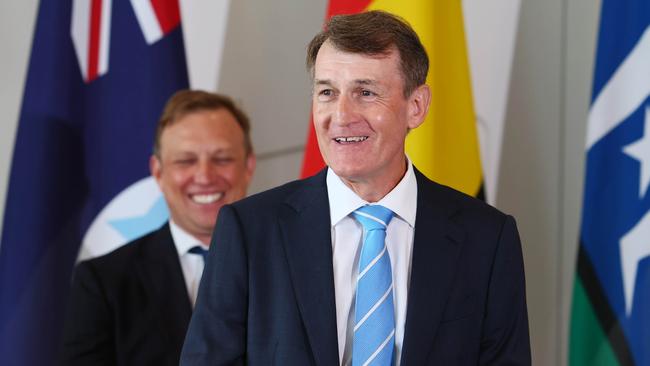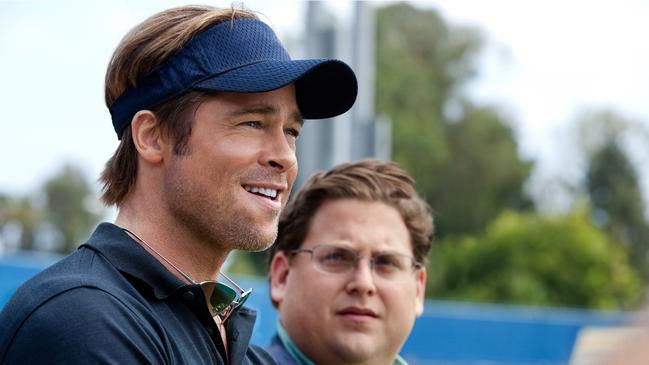No grandstanding, let’s play moneyball
With the appointment of Graham Quirk to review the progress of the 2032 Olympics, we have the moneyball thinking that underpinned the Council of Mayors (SEQ)’s initial bid now back on the table, writes Dan Petrie.
Opinion
Don't miss out on the headlines from Opinion. Followed categories will be added to My News.
Premier Steven Miles is taking his medicine like a man after appointing former Brisbane Lord Mayor Graham Quirk to review the progress of the 2032 Olympics, returning to a model of using existing venues to improve transport links as the moneyball thinking that underpinned the Council of Mayors (SEQ)’s initial bid now thankfully back on the table.
Moneyball, a book written by former Wall Street trader and financial author Michael Lewis, tells the story of major league baseball team, the Oakland Athletics (the As) who, in order to compete with the likes of the Boston Red Sox and New York Yankees, harnessed data, redeployed existing assets and did more with less.

The recruitment of players that could get to first base was the key statistic and getting extra years out of older players who were once stars was the only meaningful way to reduce the wages bill.
In fact, the New York Yankees, in a bid to free up their roster, ended up paying half of the salary of one of its ageing stars who transferred to the As.
The movie, starring Brad Pitt, soon followed and the idea of “moneyballing” sports teams spilled over into doing the same for government (moneyballforgov.com) as well as business.
(I wrote about moneyballing the Palaszczuk government only a few short years ago but no one at George St seemed to like my suggestions!)
In the 2002 season, after adopting the moneyball strategy, the As recorded a 20-game winning streak and topped American League West.
According to data from the Major League, in 2019 the cost of a win for the Oakland Athletics was $962,830 versus $2.7m for the Boston Red Sox.
That said, sport is a brutal business and the As formula which worked so well has been copied by every other team meaning Oakland needs again to innovate to improve following a rather dismal 2023 season (50 wins and 112 losses).

However, the moneyball idea of utilising existing assets for the Olympics is best illustrated by the 1984 Olympics where overheads were reduced by using existing facilities (the wrestling tournament for example was held in the 25-year-old Anaheim Convention Center for example) and maximising sponsorship for the revenue line.
Coca-Cola paper cups were everywhere and for the chair of the games, Peter Ueberroth who had started a small business, First Travel Corporation in the 1960s that had become a large corporation by the time he sold it in 1980, the LA Olympics committee was focused on a commercial outcome.
So now to Queensland and while the organising committee has a high-profile chair in Andrew Liveris with a storied corporate career in the United States and CEO in former Deloitte Australia head, Cindy Hook, the need to focus on deliverables should be the headline.
Hopefully both are well tuned into the review by former Lord Mayor, Graham Quirk, a shrewd operator who knows the southeast corner better than anyone.
The first order of the Quirk review should (or we hope) run the rule over the master plan of six new venues and upgrades while assessing what the region has at its disposal.
South East Queensland is home to world-class university campuses and private schools with facilities that are simply incredible.
The idea of duplicating venues for a two-week sporting carnival is on any objective measure nuts and clearly not what the community wants.
If a shiny new stadium (or money sink) is what is needed, then by all means try to employ some clever thinking around the location.
If the RNA Showgrounds in the city work because of pre-existing transport links then so be it.
Heck, such an option could combine quite nicely with a media centre (The Courier Mail and The Australia may have to shuffle a few desks) next door but it is an infinitely cheaper than South Brisbane proposal.
A moneyball approach to the Olympics delivers not only value for the taxpayer dollar but change as well!



